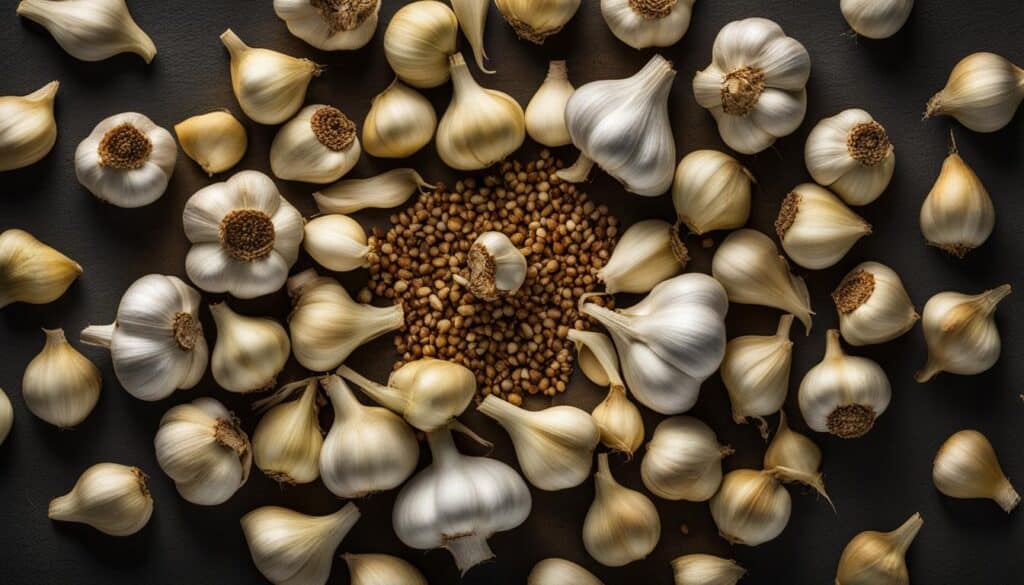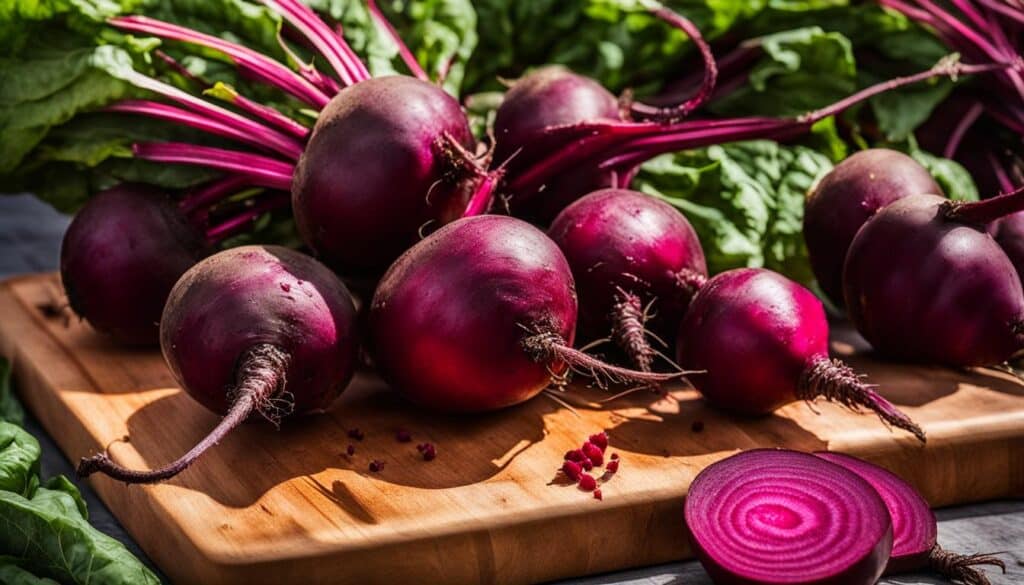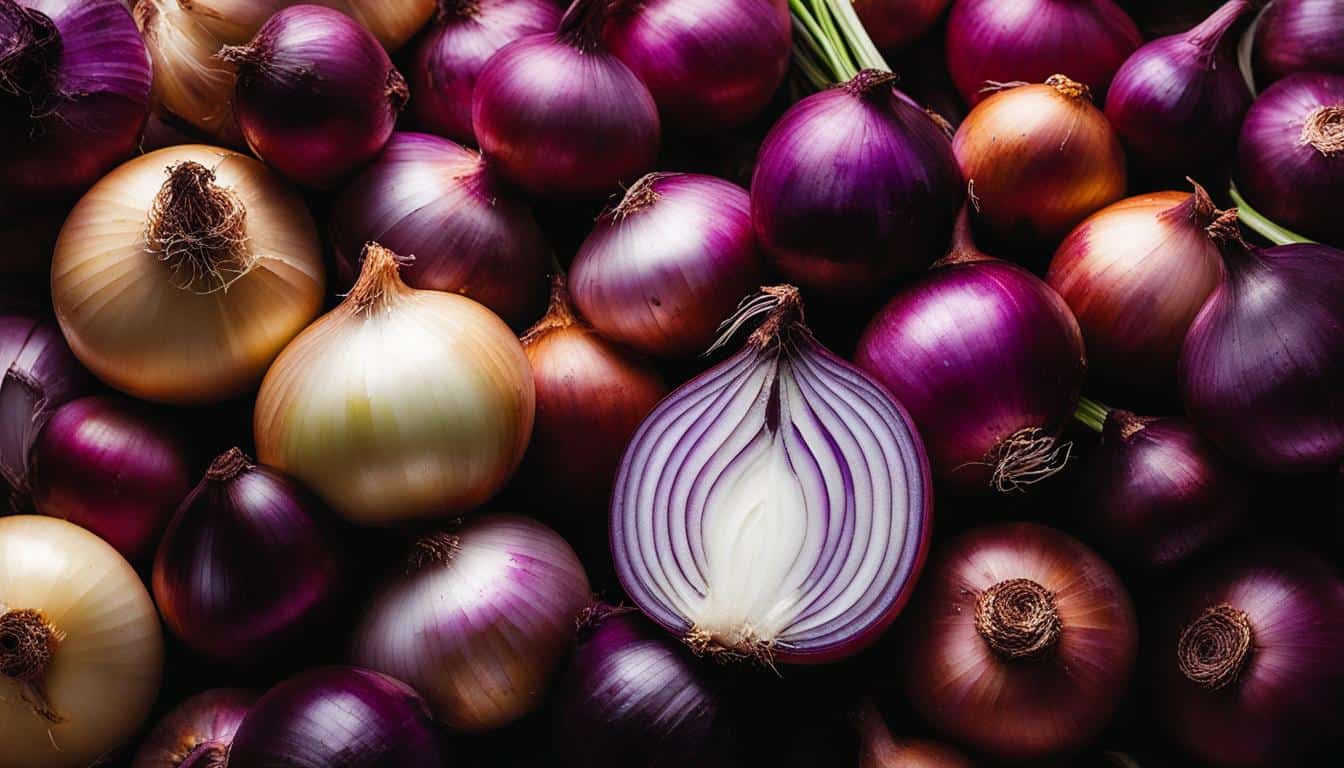When it comes to optimizing blood flow and improving overall blood health, incorporating the right fruits into your diet can make a significant difference. Not only are fruits delicious and refreshing, but they also provide essential nutrients that support a healthy cardiovascular system. Whether you’re looking to boost blood production, improve circulation, or enhance vascular health, these fruits are the top choices to naturally optimize blood health.
Key Takeaways
- Garlic, onions, beets, berries, citrus fruits, and leafy greens are among the best fruits to improve blood flow and support heart health.
- Consuming cayenne pepper can promote blood flow by lowering blood pressure and stimulating the release of vasodilators.
- Pomegranates are rich in polyphenol antioxidants and nitrates, which help improve blood flow and oxygenation of muscle tissue.
- Onions are an excellent source of flavonoid antioxidants, which widen arteries and veins and have anti-inflammatory properties.
- Cinnamon helps lower blood pressure and improve blood flow, making it a valuable addition to your diet.
Cayenne Pepper
Cayenne pepper is a powerful ingredient that can help improve blood flow and lower blood pressure. Its beneficial effects on circulation come from its ability to stimulate the release of vasodilators, such as nitric oxide, in the body. By dilating blood vessels, cayenne pepper promotes increased blood flow to tissues, optimizing their function and overall health.
In addition to its vasodilating properties, cayenne pepper also helps improve blood vessel strength and reduce plaque buildup in arteries. This can have significant benefits for cardiovascular health, as it supports healthy blood flow and reduces the risk of blockages or restrictions in the arteries.
If you’re looking to incorporate cayenne pepper into your diet, there are various ways to do so. You can add it as a spice to your meals, sprinkle it on roasted vegetables, or even mix it into your favorite sauces and dressings. Just remember to start with small amounts and gradually increase your intake to avoid any discomfort, as cayenne pepper can be quite spicy.
Health Benefits of Cayenne Pepper:
- Stimulates blood flow and improves circulation
- Lowers blood pressure by promoting vasodilation
- Strengthens blood vessels
- Reduces plaque buildup in arteries
“Cayenne pepper’s vasodilating properties help increase blood flow and optimize cardiovascular health.”
If you’re planning to incorporate cayenne pepper into your diet to promote better blood flow and lower blood pressure, it’s always a good idea to consult with your healthcare provider first, especially if you have any existing medical conditions or are taking medications that may interact with cayenne pepper.
| Cayenne Pepper | Health Benefits |
|---|---|
| Stimulates blood flow | Improves circulation |
| Low blood pressure | Vasodilation |
| Strengthens blood vessels | Reduces plaque buildup |
Pomegranate
I absolutely love including pomegranate in my diet. Not only are these vibrant fruits delicious and refreshing, but they also offer numerous health benefits, especially when it comes to optimizing blood flow and oxygenation of muscle tissue.
Pomegranates are rich in polyphenol antioxidants and nitrates, making them potent vasodilators. These compounds help relax and widen blood vessels, enhancing blood flow and ensuring that vital nutrients and oxygen reach the muscle tissue efficiently.
For active individuals and athletes, improved blood flow and oxygenation are essential for better performance and faster recovery. By incorporating pomegranate into your diet, you can support your muscles’ oxygenation and overall health.
One of the great things about pomegranate is its versatility. You can enjoy it as a fresh fruit, sprinkle the arils onto salads or yogurt, or even add the juice to smoothies. However you choose to include it in your diet, your body will thank you for the boost in blood flow and oxygenation.
Summary: Benefits of Pomegranate for Blood Flow and Muscle Oxygenation
| Benefits | How Pomegranate Helps |
|---|---|
| Improved blood flow | Rich in polyphenol antioxidants and nitrates, pomegranate acts as a vasodilator, promoting better blood circulation. |
| Enhanced muscle oxygenation | Pomegranate’s vasodilatory effects ensure optimal oxygen delivery to muscle tissue, benefiting active individuals and athletes. |
| Versatile and delicious | Pomegranate can be enjoyed in various ways, from eating the fresh fruit to adding the juice or arils to meals and snacks. |
Onions
Onions are an excellent addition to a heart-healthy diet. These flavorful vegetables are not only packed with deliciousness but also offer a range of health benefits. One of the key reasons onions are beneficial for heart health is their high content of flavonoid antioxidants.
Flavonoids are natural compounds found in various plant foods, including onions, that have been linked to numerous health benefits. When it comes to heart health, flavonoids play a crucial role in widening arteries and veins, thereby improving blood flow throughout the body.
But that’s not all! Onions also possess anti-inflammatory properties, further contributing to heart health. Chronic inflammation has been associated with an increased risk of heart disease, so reducing inflammation can be vital for maintaining a healthy heart.
By including onions in your diet, you can enjoy the double benefits of their flavonoid antioxidants and anti-inflammatory properties, both of which promote optimal blood flow and overall heart health.
Why Onions Are Good for Heart Health:
- High in flavonoid antioxidants
- Widens arteries and veins
- Improves blood flow
- Has anti-inflammatory properties
How to Incorporate Onions into Your Diet:
Here are a few delicious ways to include onions in your meals:
- Add sautéed onions to stir-fries or vegetable dishes for an extra burst of flavor.
- Include raw onions in salads or sandwiches for added crunch and taste.
- Use caramelized onions as a topping for burgers, pizzas, or savory tarts.
- Blend onions into soups, stews, or sauces for added depth of flavor.
With their delicious taste and numerous health benefits, onions are undoubtedly a valuable addition to any heart-healthy diet.
Cinnamon

When it comes to promoting blood flow and maintaining healthy blood pressure levels, cinnamon is a powerful spice that can provide significant benefits. Research has shown that cinnamon can effectively reduce blood pressure, especially diastolic blood pressure, which is the pressure in your blood vessels when your heart rests between beats.
Cinnamon contains compounds that have been found to improve blood vessel function and enhance blood flow, ultimately contributing to better cardiovascular health. It helps to relax the blood vessels, allowing blood to flow more smoothly and efficiently throughout the body. By improving blood flow, cinnamon supports the delivery of oxygen and nutrients to all organs and tissues, promoting their optimal function and overall well-being.
There are several ways to incorporate cinnamon into your diet. Adding a sprinkle of cinnamon to your morning oatmeal, coffee, or smoothie is a simple way to enjoy its benefits. You can also try using cinnamon in baking or cooking, adding it to dishes like roasted vegetables, stews, or desserts.
If you prefer a more convenient option, cinnamon supplements are available in capsule or powder form. However, it’s important to consult with a healthcare professional before starting any new supplement regimen to ensure it aligns with your individual needs and medical history.
In summary, cinnamon is a natural and flavorful spice that can help improve blood flow and regulate blood pressure. Whether you choose to use it in your meals or opt for a supplement, incorporating cinnamon into your daily routine can support your cardiovascular health and contribute to overall well-being.
Discover the benefits of cinnamon:
| Benefits of Cinnamon | How it Supports Blood Flow and Pressure |
|---|---|
| Reduces blood pressure | Cinnamon helps lower diastolic blood pressure and promotes healthy blood pressure levels. |
| Improves blood flow | By relaxing blood vessels, cinnamon enhances blood flow throughout the body, supporting optimal organ function. |
| Delivers nutrients | Improved blood flow ensures the efficient delivery of oxygen and nutrients to all organs and tissues. |
| Enhances cardiovascular health | Cinnamon’s ability to support blood flow and regulate blood pressure contributes to overall cardiovascular well-being. |
Note: The image above illustrates the benefits of cinnamon for blood flow and overall cardiovascular health.
Garlic

Garlic is a flavorful ingredient commonly used in cooking, but it offers more than just taste. Its sulfur compounds have been found to have several health benefits, including improving blood flow and lowering blood pressure.
The sulfur compounds present in garlic help relax blood vessels, allowing for increased tissue blood flow. This can have positive effects on overall cardiovascular health, as proper blood flow is essential for delivering oxygen and nutrients to various parts of the body.
Studies have shown that garlic supplementation can also lead to a reduction in blood pressure levels. Lowering blood pressure is crucial for individuals with hypertension or those at risk of coronary artery disease, as it helps alleviate strain on the heart and lowers the chances of heart-related complications.
In fact, research has demonstrated that regular consumption of garlic can improve blood flow even in individuals with existing coronary artery disease. This is particularly significant, as coronary artery disease is a condition characterized by reduced blood flow to the heart due to narrow or blocked arteries.
To incorporate garlic into your diet, you can add it to various dishes such as sautés, sauces, or roasted vegetables. Just remember that fresh garlic provides the most health benefits, so try to include it in your recipes whenever possible.
It’s important to note that while garlic offers potential health advantages, it may not be suitable for everyone. Some individuals may experience gastrointestinal issues or interactions with certain medications. If you have any concerns or underlying health conditions, it’s best to consult with a healthcare professional before significantly increasing your garlic consumption.
| Garlic Benefits | How It Works |
|---|---|
| Improved blood flow | Sulfur compounds in garlic relax blood vessels |
| Lowered blood pressure | Garlic supplementation can lead to reduced blood pressure levels |
| Positive impact on coronary artery disease | Regular garlic consumption improves blood flow in individuals with the condition |
So, don’t be afraid to add a little extra garlic to your meals. Not only will it enhance the flavors, but it may also provide you with potential cardiovascular benefits.
Quick Facts: Garlic
- Garlic is a versatile ingredient that adds distinctive flavor to a wide range of dishes.
- The sulfur compounds in garlic are responsible for many of its health benefits.
- Garlic can increase tissue blood flow and lower blood pressure by relaxing blood vessels.
- Regular consumption of garlic has been shown to improve blood flow in individuals with coronary artery disease.
Fatty Fish

When it comes to optimizing blood flow and cardiovascular health, incorporating fatty fish into your diet can be highly beneficial. Fatty fish such as salmon and mackerel are rich in omega-3 fatty acids, which play a crucial role in promoting healthy blood circulation.
The omega-3 fatty acids found in fatty fish have been shown to enhance the release of nitric oxide in the body. Nitric oxide is a powerful vasodilator, meaning it relaxes and widens blood vessels, allowing for improved blood flow. By promoting vasodilation, omega-3 fatty acids can help increase blood flow to vital organs and tissues throughout the body.
Furthermore, omega-3 fats also contribute to inhibiting blood clot formation. Blood clots can be dangerous as they can obstruct blood flow and potentially lead to serious health issues such as stroke or heart attack. By incorporating fatty fish into your diet, you can help reduce the risk of blood clot formation and promote a healthier cardiovascular system.
To reap the benefits of fatty fish, aim to include them in your meals at least twice a week. Whether grilled, baked, or poached, there are numerous delicious ways to incorporate salmon, mackerel, and other fatty fish into your diet.
Benefits of Fatty Fish:
- Rich in omega-3 fatty acids that promote the release of nitric oxide
- Enhances blood flow through vasodilation
- Inhibits blood clot formation
- Promotes a healthier cardiovascular system
Next, let’s delve into the benefits of another superfood for blood circulation: beets.
Beets

Beets are a versatile and nutritious root vegetable that can significantly contribute to improving blood health. They are rich in nitrates, which the body converts into nitric oxide, a powerful vasodilator. Nitric oxide relaxes blood vessels, allowing for better blood flow throughout the body. By incorporating beets into your diet, you can experience several benefits for your cardiovascular system.
Lowering Blood Pressure
Consuming beets or beet juice has been shown to lower blood pressure levels. The high nitrate content in beets helps relax and widen blood vessels, reducing resistance to blood flow. This effect can lead to a decrease in both systolic and diastolic blood pressure, promoting better overall cardiovascular health.
Improving Clotting Time
Beets have been found to improve blood clotting time due to their nitrate content. Nitric oxide produced from nitrates helps prevent blood clot formation by enhancing the smooth flow of blood. This can be particularly beneficial for individuals with a history of clotting disorders or those at an increased risk of cardiovascular events.
Reducing Inflammation
Chronic inflammation can damage blood vessels and impair blood flow. Beets contain antioxidants and anti-inflammatory compounds that can help reduce inflammation within the body. By incorporating beets into your diet, you may experience a decrease in blood vessel inflammation, which can contribute to improved blood flow and overall cardiovascular health.
To enjoy the benefits of beets, consider incorporating them into your meals in various ways. They can be enjoyed roasted, steamed, juiced, or grated and added to salads or smoothies. Experiment with different recipes to find what suits your taste buds best.
Remember to consult with a healthcare professional before making any significant changes to your diet, especially if you have any underlying medical conditions.
| Benefits of Beets |
|---|
| Lowering blood pressure |
| Improving clotting time |
| Reducing inflammation |
Turmeric

Turmeric, specifically its compound called curcumin, has been widely used in traditional medicine for its potential health benefits. One area where turmeric shows promise is in improving blood circulation by opening up blood vessels.
Curcumin, the active ingredient in turmeric, has been found to have vasodilatory effects, meaning it helps relax and widen blood vessels. By doing so, curcumin may enhance blood flow throughout the body, improving nutrient and oxygen delivery to various organs and tissues.
A study published in the journal Pharmacological Research found that curcumin supplementation significantly increased blood flow in healthy individuals. Another study in individuals with metabolic syndrome showed that curcumin supplementation improved endothelial function, a key indicator of blood vessel health and flexibility.
Not only can turmeric enhance blood flow, but it may also benefit overall cardiovascular health. Curcumin has been shown to have anti-inflammatory and antioxidant properties, which can help protect the blood vessels from damage and reduce the risk of cardiovascular diseases.
To incorporate turmeric into your diet, you can add it to various dishes, such as curries, smoothies, or golden milk. You may also consider taking turmeric or curcumin supplements, which are available in capsule or extract form.
Benefits of Turmeric for Blood Flow:
- Opens up blood vessels, improving circulation
- Enhances nutrient and oxygen delivery to organs and tissues
- Improves endothelial function, a measure of blood vessel health
- Has anti-inflammatory and antioxidant properties for cardiovascular health
It’s important to note that while turmeric and curcumin show promising potential in improving blood flow, more research is needed to fully understand their effects and determine optimal dosage recommendations. If you have any underlying medical conditions or are taking medications, it’s best to consult with your healthcare provider before adding turmeric supplements to your routine.
Leafy Greens
When it comes to optimizing blood flow and supporting heart health, leafy greens should definitely be on your plate. Spinach and collard greens, for instance, are packed with nitrates, which have the ability to convert into nitric oxide, a powerful vasodilator. Nitric oxide helps relax and widen blood vessels, promoting better blood circulation throughout the body.
“Including leafy greens like spinach and collard greens in your diet can be an easy and delicious way to help lower blood pressure,” says Dr. Smith, a renowned cardiologist. “The nitrates present in these vegetables play a crucial role in maintaining healthy blood pressure levels and optimizing cardiovascular health.”
Furthermore, leafy greens are rich in essential nutrients such as vitamins A, C, and K, as well as folate and fiber, which contribute to overall heart health and can help prevent conditions like high blood pressure and cardiovascular disease.
Conclusion
Improving blood circulation and overall cardiovascular health is crucial for maintaining a healthy lifestyle. One of the key ways to achieve this is through a balanced diet that includes nutrient-rich foods. Incorporating the 13 best foods mentioned above into your diet can significantly enhance blood circulation and promote optimal vascular health.
It is important to note that a healthy diet alone is not enough to ensure cardiovascular health. Regular exercise, proper hydration, weight management, and avoiding smoking are also essential factors in maintaining a healthy cardiovascular system.
Before making any major dietary changes or starting a new treatment plan, it is always recommended to consult with a healthcare professional. They can provide personalized guidance and ensure that any changes to your diet align with your specific health needs and goals.
FAQ
What are the best fruits to increase blood health naturally?
Some of the best fruits to increase blood health naturally include cayenne pepper, pomegranate, onions, cinnamon, garlic, beets, turmeric, citrus fruits, tomatoes, berries, and ginger.
How does cayenne pepper improve blood flow?
Cayenne pepper promotes blood flow by lowering blood pressure and stimulating the release of nitric oxide and other vasodilators. It helps increase circulation, improves blood vessel strength, and reduces plaque buildup in arteries.
What benefits does pomegranate offer for blood circulation?
Pomegranates are high in polyphenol antioxidants and nitrates, which are potent vasodilators. Consuming pomegranate may improve blood flow and oxygenation of muscle tissue, especially beneficial for active individuals and athletes.
How do onions contribute to blood flow and heart health?
Onions are an excellent source of flavonoid antioxidants, which benefit heart health by widening arteries and veins, improving blood flow. They also have anti-inflammatory properties, which can further boost blood flow and heart health by reducing inflammation.
How does cinnamon affect blood flow?
Cinnamon has been found to reduce blood pressure and improve blood flow. It helps lower diastolic blood pressure and has a favorable effect on overall blood pressure levels. Cooking with cinnamon or taking a supplement can provide these benefits.
What is the impact of garlic on blood flow and blood pressure?
Garlic, specifically its sulfur compounds, can increase tissue blood flow and lower blood pressure by relaxing blood vessels. It has been shown to improve blood flow in individuals with coronary artery disease.
Why are fatty fish beneficial for blood circulation?
Fatty fish like salmon and mackerel are excellent sources of omega-3 fatty acids, which promote the release of nitric oxide, dilate blood vessels, and increase blood flow. Omega-3 fats also help inhibit blood clot formation.
How do beets improve blood flow and blood pressure?
Beets are high in nitrates, which your body converts into nitric oxide, a vasodilator that relaxes blood vessels and improves blood flow. Consuming nitrate-rich beet juice has been shown to decrease blood pressure, clotting time, and blood vessel inflammation.
What is the role of turmeric in blood circulation?
Turmeric, specifically its compound called curcumin, has been used in traditional medicine to improve blood circulation by opening up blood vessels. Curcumin supplementation has been found to increase blood flow.
How can leafy greens help with blood pressure and blood flow?
Leafy greens like spinach and collard greens are high in nitrates, which your body converts into nitric oxide, a potent vasodilator. Research suggests that including these vegetables in your diet can help lower blood pressure.
How can a healthy diet and lifestyle enhance blood circulation?
Improving blood circulation and overall cardiovascular health can be achieved through a healthy, balanced diet that includes nutrient-rich foods, regular exercise, proper hydration, weight management, and not smoking. Together, these factors significantly enhance blood circulation and promote optimal vascular health.
Remember to consult with a healthcare professional before making any major dietary changes or starting any new treatment plans.





Leave a Reply